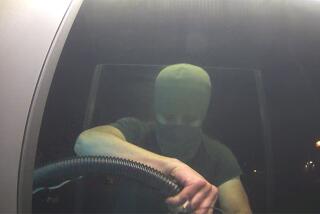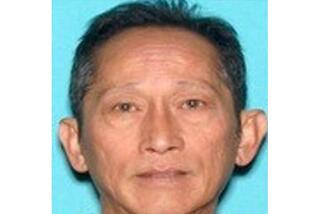U.S.-Canadian Pact May Snag Ng Extradition
- Share via
CALGARY, Canada — Legal entanglements that could knot up efforts to extradite Charles C. Ng, linked to the disappearance or deaths of 22 people in California, surfaced Sunday as American officials arrived here to question the suspect.
Ng, 24, remained under 24-hour suicide watch in jail in this Western Canadian city, where he was arrested Saturday after shooting and slightly wounding a security guard who suspected him of shoplifting dry goods and food from the basement supermarket of a department store. Calgary police said Ng refused to talk to California authorities Sunday.
Nine Bodies Found
Ng is believed to be the partner of Leonard Lake, who apparently committed suicide after his arrest in South San Francisco on June 2. Since then, police have found nine bodies and 40 pounds of human bone fragments at a Wilseyville, Calif., cabin where Lake lived.
Police have released a list of 22 missing people or murder victims who they believe had contact with Lake and Ng. At this point, however, the only California and federal warrants against Ng accuse him of kidnaping, false imprisonment and unlawful flight.
Canadian authorities are thus faced with a choice:
They could keep Ng, try him on their own attempted murder charge and then extradite him to California after trial or after releasing him from prison if he were to be convicted.
Or they could decide that the multiple California charges are in sum a more serious matter and extradite him to California immediately.
“He is charged with a very serious crime here, attempted murder, and local police already are saying, ‘Let’s keep him here,’ ” said Charlie Stewart, a Calgary defense attorney who volunteered to advise Ng on his rights under Canadian law. “Everybody wants a piece of him.”
Complicating the matter is the likelihood that Canadian courts will refuse to surrender Ng if California authorities plan eventually to charge him with crimes that could lead to a death sentence.
Capital Punishment
Calgary extradition attorney Mark Tyndale said that one section of the extradition pact between the two nations, which dates from the 19th Century, stipulates that “an extradition judge shall not sign a warrant if charges include the death penalty.”
Canada has no death penalty, Calgary Police Inspector Roy E. Anderson said, and Canadian courts have in the past refused to return criminals who might be put to death for their crimes.
“Canada will not allow him to be extradited if he is facing a crime punishable by death in the United States,” he said flatly. “If you want to take him back, you will have to . . . assure our judges . . . that the offense he would be facing would not be punishable by death.”
Another option open to both countries is the simple deportation of Ng as an undesirable alien. However, Ng is a native of Hong Kong and thus is a British subject; it is not clear if he could be deported back to the United States. Stewart, the defense lawyer, said he probably would be deported to Hong Kong.
California officials were aware of the potential extradition problems when they flew to Calgary early Sunday morning to interview Ng and consult with authorities here.
Legal Roadblocks
“If he (fights) extradition,” said San Francisco Police Inspector Ed Erdelatz, “God knows the legal roadblocks that could occur.”
Just such roadblocks were encountered in another Canadian extradition case last October.
In that case, a Seattle mass-murder suspect--who, coincidentally, also was born in Hong Kong and captured in Calgary--agreed to stop fighting extradition only after Washington state authorities agreed to reduce the charges against him to eliminate the possibility of the death penalty.
California officials, however, were reluctant to speculate about Ng’s legal future or any discussions that might take place with Canadian authorities.
“We don’t want to step on anyone’s toes,” said Detective Sgt. Ron McFall of the Calaveras County Sheriff’s Department. “This thing has come together so quickly we’ve had no time to formulate a game plan.”
Besides the severity of the crimes to which he has been linked--if the death toll does reach 22, it would be the second-highest mass murder total in California history, after the 25 slayings attributed to Juan Corona in Yuba City in 1971--Ng is important to California officials because they believe he may be the only person who can sort out exactly what happened in Wilseyville, a rural community southeast of Sacramento.
Ng, a friend and sometimes house mate of Lake since 1981, has been the target of an international manhunt since authorities began uncovering bodies and human bone fragments in Wilseyville. Police fear that victims may have been kidnaped and held in a concrete bunker on the Wilseyville property, where they were tortured and murdered, and the bodies then dismembered and burned.
So far, authorities said Ng refuses to answer questions, either to San Francisco police, who are investigating most of the missing people linked to Lake and Ng, or Calaveras County sheriff’s investigators, who are in charge of the Wilseyville death site.
“He keeps his head down,” said Staff Sgt. Roger A. Boiteau of the Calgary Police Department. “He just keeps his head down and doesn’t say anything.”
Ng was scheduled to appear this morning in Alberta Provincial Court, where he will formally be read the Canadian charges against him and will be asked if he wants to enter a plea.
Police Investigation
Calgary authorities said Ng probably will be held another week while local police complete their investigation into the alleged shoplifting incident and while Ng’s attorney becomes familiar with the case.
If Ng cannot afford an attorney, Canadian law allows for free legal aid.
Such aid probably will be necessary, because Calgary police suspect Ng was out of cash and living the life of a transient at the time of his arrest. The possibility that Ng’s sister or some other relative may live in the area is being investigated, said Boiteau, but Ng, who has described himself as a survivalist, apparently was living outdoors.
Among the items seized when Ng was arrested, Boiteau said, was a canister of fuel used for camp stoves. The food he apparently was trying to steal, Boiteau noted, did not require refrigeration.
Ng was dressed in blue jeans, a light blue T-shirt and running shoes when taken into custody, he added.
Officials did not say whether they knew how Ng was able to travel from Sudbury, Ontario, where he last was tentatively sighted on June 14, west to Calgary, a distance of 1,910 miles.
Stewart, who is president of the Calgary Defense Lawyers Assn., said he already has advised Ng that under Canadian law he is not obligated to talk to any police agent, either from Canada or from the United States.
Stewart voluntarily counseled Ng after hearing news accounts of his arrest and said that a number of defense lawyers in Calgary already have expressed a willingness to represent Ng.
“With the charges he’s facing,” Stewart said, “he’ll have no difficulty finding counsel, even though he’s not a Canadian.”
Louis Sahagun reported from Calgary and Mark A. Stein from San Francisco.
More to Read
Sign up for Essential California
The most important California stories and recommendations in your inbox every morning.
You may occasionally receive promotional content from the Los Angeles Times.














